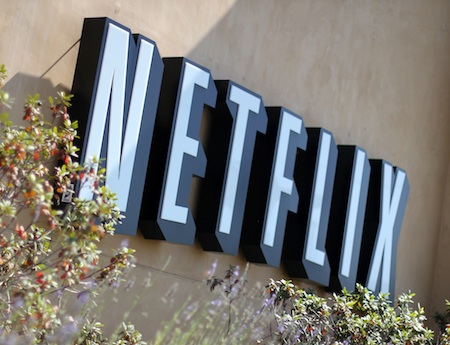Netflix, AT&T Trade Punches Over Paid Peering

The smarter way to stay on top of broadcasting and cable industry. Sign up below
You are now subscribed
Your newsletter sign-up was successful
Netflix and AT&T sparred over paid peering Wednesday at an Aspen Institute panel session on network neutrality.
Chris Libertelli, VP of global government relations at Netflix, told the Washington audience that if ISPs are allowed to start levying "access charges" on Internet traffic, it will attract new regulations and could lead to a retrans-style regime of payments for carriage.
Libertelli echoed complaints that Comcast had congested its "pathways" in order to charge Netflix and others. Netflix and Comcast struck a paid peering deal, but Netflix has complained it was a shotgun marriage.
AT&T senior executive VP James Cicconi countered that paying for traffic exchanges was the way the Internet was built, that Netflix has always paid, and that he understood why Netflix would want to try to get something for free that they had previously paid for. But he said that you can't take that customary relationship, re-label the payments access charges--he said they are not access charges--and make it into something new and threatening.
Comcast exec Sena Fitzmaurice was in the audience and had this response to Netflix's charge: “The only company who decides how Netflix traffic is deliver to us is Netflix. They choose the path the traffic takes to us. They can choose to avoid congestion or inflict it. As we’ve noted before, how Netflix routes its own traffic is all about improving their business model. Independent commenters have pointed out that Netflix commercial transit decisions created these issues.”
Netflix argues that paid priority is a network neutrality issues, suggesting that it moves the discrimination issue from the last mile to network traffic relationships.
Columbia Law Professor Tim Wu, who coined the term network neutrality, pointed out that most peering arrangements are not for money and that he, too, was concerned about the retrans/cable-ization model of paid carriage deals becoming the norm. He also said there was a difference when talking about ISPs with control of, say, 20 million customers, who had in effect "termination point" monopolies of those customers.
The smarter way to stay on top of broadcasting and cable industry. Sign up below
Contributing editor John Eggerton has been an editor and/or writer on media regulation, legislation and policy for over four decades, including covering the FCC, FTC, Congress, the major media trade associations, and the federal courts. In addition to Multichannel News and Broadcasting + Cable, his work has appeared in Radio World, TV Technology, TV Fax, This Week in Consumer Electronics, Variety and the Encyclopedia Britannica.

